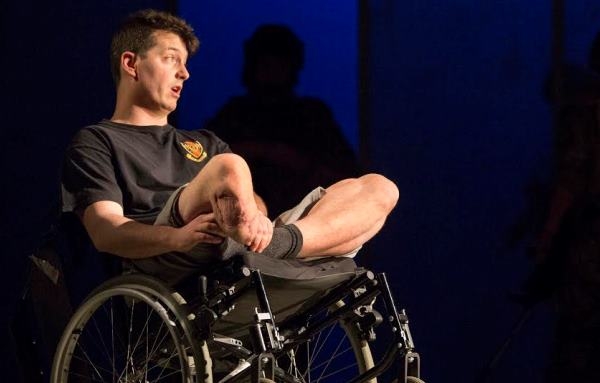The Two Worlds of Charlie F (Tour – Manchester)
”Charlie F” is an Excellent play that deserves a bigger audience, says David Cunningham.

© Cylla von Tiedemann
The Two Worlds of Charlie F is one of a number of plays visiting Manchester this season based on interviews with people who were involved in actual events.
The play stands out because its cast includes the wounded, Injured and Sick (WIS) army personnel whose life stories provide the raw material for the script. This sounds, to put it mildly, manipulative yet the script, by Owen Sheers from a concept by Alice Driver, is so absorbing and the performances so powerful that the casting is revealed as logical rather than exploitative.
Corporal Charlie Fowler (Marine Cassidy Little) lives in two worlds. His injured body is in Birmingham whilst his scattered mind is back in Afghanistan where he was wounded. Charlie, with his comrades and their families, recall their motivation in joining the army and reveal how the service philosophy of adapting to, and overcoming, obstacles helped them cope with their injuries. But the company begin to acknowledge that they have to move on.
The imaginative staging of director Stephen Rayne makes the play far more than a series of monologues. The chaos and confusion of warfare is caught as speeches are interrupted by bloody loud noises and startling light effects. The disordered state of Charlie’s mind is reflected as the play slips from drama and draws in elements of musicals and dance. Bombardier Gareth Crabb delivers a bollocking in verse form and choreographer Lily Phillips transforms a physical therapy session into a dance number.
Family support and influence are major themes of Owen Sheers’s script. Most of the soldiers mention the pride experienced by their family after they joined or that they were continuing a family tradition. As the story is told from the point of view of the soldiers the army is portrayed as a family substitute in which members are anxious to support comrades in need.
This is a rather idealised viewpoint – from the play you’d think the army is the only workplace without routine work, bullying, racism, sexism or homophobia. The script achieves great power with small details – having received notice of her husband’s injury at 5am a wife becomes unable to sleep past that time.
The most striking feature of The Two Worlds of Charlie F is, however, the inspirational absence of bitterness or self-pity. The characters are traumatised but rather than acknowledge defeat, struggle to find the best way of recovery.
This is conveyed by the simple dignity of the performances as the cast interact with a casual ease even when discussing the most horrendous events or comparing wounds. Marine Cassidy Little makes his opening speech with his leg, amputated below the knee, casually resting on a crutch. Darren Swift reveals that double amputees are in demand as performers in pornographic films.
It is the ambition of many producers to achieve authenticity in their work and The Two Worlds of Charlie F fulfils this objective with an understated but powerful show that demonstrates the human cost of conflict. A point made by the current tour being dedicated to Jack Davies, a member of the original cast, who since passed away aged just 23.
The Two Worlds of Charlie F is at the Manchester Opera House until 14 June.
Dave Cunningham












